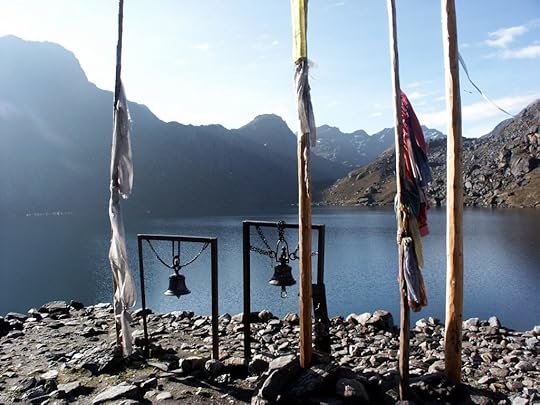Mark Horrell's Blog, page 31
May 3, 2017
What Ueli Steck meant to ordinary people like me
I genuinely believed that Ueli Steck was one of those extreme climbers who would end up living to a ripe old age – not because I thought he would be one of the lucky ones, but because he was that good.
I was shocked when I woke up on Sunday to the news that Ueli was gone. His body had been found near Camp 1 in Everest’s Western Cwm. He had apparently fallen 1000m while climbing unroped and unprotected on Nuptse.
Tributes have poured in from the climbing community. He was respected by everyone...
April 26, 2017
The fate of Langtang village two years after the Nepal earthquake
There is no doubt that one of the most jaw-dropping experiences of my recent visit to the Langtang Valley in Nepal was passing through Langtang village, the site of a devastating landslide during the 2015 earthquake. Yesterday was the second anniversary of that terrible event, so it seems like the right moment to remember what happened, describe what I saw two years on, and see what the future holds.
The Langtang region sits on Nepal’s border with Tibet, a short distance north of Kathmandu. I...
April 19, 2017
For busy executives: the world’s shortest 8,000m peak expedition
We try to steer away from controversy here on the Footsteps on the Mountain blog, but sometimes difficult subjects have to be tackled.
It’s been a while since we did our last interview. You may remember that some time ago we interviewed champion rock climber Bill Scheidt on the use of sun cream in mountaineering. That interview proved so explosive that we had to close the comments for fear it might provoke all-out war within the climbing community.
It’s partly for this reason we have avoided...
April 15, 2017
Thieves, Liars and Mountaineers has been fully revised in digital format
A quick Saturday book update.
I’m in the process of having selected titles from my Footsteps on the Mountain Travel Diaries series professionally edited by my regular editor Alex Roddie. Bit by bit I am updating the books and publishing revised editions. The new versions will have brand new covers, and will be available in both ebook and paperback format (until now they have only been available digitally).
 A revised digital edition of Thieves, Liars and Mountaineers is available to download n...
A revised digital edition of Thieves, Liars and Mountaineers is available to download n...
April 12, 2017
From wasteland to wonderland: a trek in Langtang
Today’s post is a whopper, so fetch yourself a cup of tea (if you’re British) or a coffee (if you’re Italian). Everyone else can grab a beer (and if you don’t drink then I’m sorry).
I’ve known for a long time that Nepal is a land of contrasts – from the jungle lowlands in the south, to the terraced farmland of the cultivated middle hills, to the towering snowcaps of the Himalayas in the north.
From the madness, pollution and crowds of Kathmandu, you can climb up into the hills and witness the...
April 5, 2017
Reality Check: Will there be a huge clear up of garbage on Everest this year?
In this era of fake news, the BBC has launched a Reality Check series to analyse popular news stories that sound plausible, and assess whether or not they’re bollocks.
I thought it might be fun to run one the BBC’s own stories through a reality check to see whether or not they measure up to the mark themselves.
 BBC Reality Check: Brexit seems to provide a rich source of material for them
BBC Reality Check: Brexit seems to provide a rich source of material for them So let’s pick a story at random such as … well, how about this one published last week about garbage on Mo...
March 29, 2017
The 3 curses of the Himalayan snow
There’s no such thing as an easy Himalayan peak. I knew this already. For various reasons in the past I’ve failed to get up 6000, 7000 and 8000m peaks. Until now I’ve not made any attempts on 5000ers, but I expected the same principles to apply.
It’s officially still winter in Nepal until 21 March. That’s why this year the Spaniard Alex Txikon persevered with his winter attempt on Everest until halfway through March. Mountaineering bodies may classify it as winter, but for locals (and nature)...
March 22, 2017
The climate zones of Kilimanjaro from space
Another short one for you today (said the bishop to the actress), as I’m still trekking in Langtang as you read this, somewhere close to the summit of a mountain (unless you’re reading it a few weeks later, in which case I could be anywhere).
I’ve talked a bit about the glaciers on Kilimanjaro, and how they are shrinking at an alarming rate, but what about the climate on the rest of the mountain?
In January, the NASA Earth Observatory released this fantastic aerial photo of the whole mountain...
March 15, 2017
The story of Gosainkund, the sacred mountain lake
A quickie today, because I’m not actually here. I’m trekking somewhere in the Langtang Valley, Nepal, with no access to the internet.
Last time I was there, my Nepalese friend Siling, who is fond of a story, told me about the origin of Gosainkund, the sacred lake that I will be passing as I cross over the Laurebinayak La, a high pass dividing the Langtang and Helambu regions of Nepal.
 Prayer flags and ceremonial bells beside the shores of Gosainkund
Prayer flags and ceremonial bells beside the shores of Gosainkund There are actually a series of lakes in the...
March 8, 2017
My first visit to the Langtang Valley
By the time you read this Edita and I will be somewhere in the Helambu region of Nepal, an area of low-lying hills and terraced fields north of Kathmandu. Our destination is the Langtang Valley, which until recently was Nepal’s third most popular trekking region, after Everest and the Annapurnas.
Two years ago, the Langtang Valley was the scene of a great tragedy. Langtang village lies directly beneath 7,227m Langtang Lirung, the highest mountain in the region. The narrow valley witnesses man...



